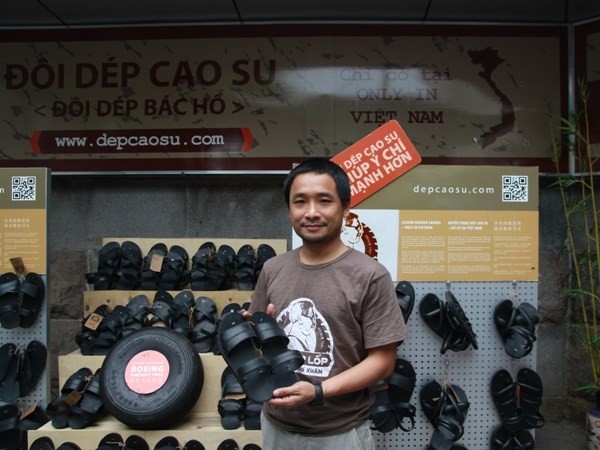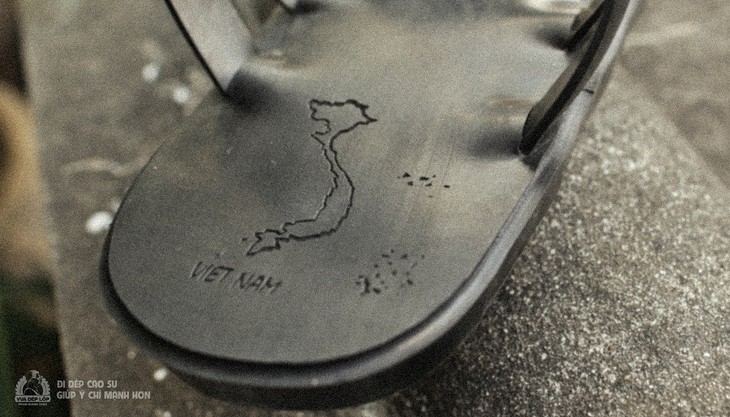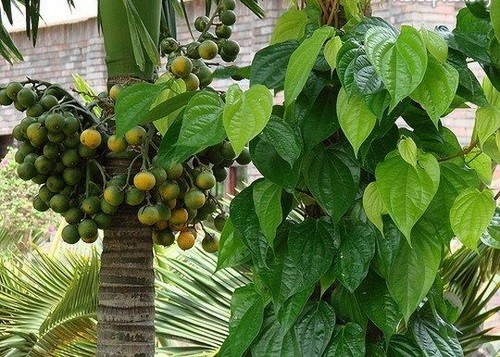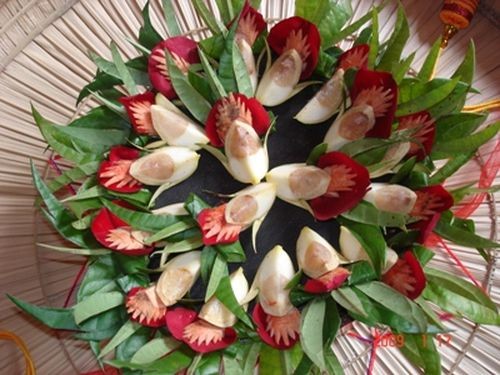B: We’re also very happy to welcome new listener, Deep Paul of India. He listened to our program on July 2nd on 7220khz and said SINPO at all 4s. “I’m a new listener of your station,” he said. “I’m a student. I enjoy your programs and send you reports regularly.”
A: The fun fact of radio is we talk to millions of people around the world without seeing them. Even when we've corresponded with each other, we've never actually met. Thank you very much Brian Keefe and Deep Paul for listening to VOV and for sending us your feedback. We’ll send you our latest frequency list and program guide for future listening.
B: Tim Harper read the story on our website about a man making rubber tire sandals in Hanoi and has asked us how he can buy a pair. The story features Pham Xuan Quang and his family trade of making sandals from disused tires. Quang is commonly known as the King of Tire Sandals.
 Cuong, the son of the King of tire sandals Pham Quang Xuan Cuong, the son of the King of tire sandals Pham Quang Xuan |
A: Tire sandals were used by Vietnamese soldiers during Vietnam’s two national resistance wars. Tire sandals were light, durable, and suitable for Vietnamese soldiers in jungles. Of course, they are cheap and easy to make too. Vietnamese soldiers now wear shoes and plastic sandals instead of tire sandals. Some ordinary people wear tire sandals as a hobby or convenient footwear for particular work.
B: In general most Asians, including Vietnamese, prefer to wear sandals. It’s because they are lighter and cooler than leather or synthetic material shoes. Besides it is more suitable for the climate, whether scorching hot or monsoon rains, sandals are the best footwear.
 Xuan carves the Vietnamese map on his tire sandals Xuan carves the Vietnamese map on his tire sandals |
A: In wartime, Vietnamese soldiers wore heavy boots and socks in the tropical climate with high humidity level, they were bound to suffer from a foot infection. They didn’t have the comfort of a clean water and soap, so trouble began when their boots and socks got wet. With sandals their feet would dry in a matter of minutes.
B: Tim Harper, if you want to buy Pham Quang Xuan’s tire sandals, search the internet for depcaosu.com to choose many tire sandal styles. What makes Xuan’s tire sandals different from others is that each pair of sandals produced by Xuan’s family is carved with a map of Vietnam. If buyers want to customize, the craftsmen can carve something as a memory of Vietnam on the sandal.
A: Win Tun read a story on our website about a Vietnamese farmer in Hawaii. Lam Hanh’s farm grows typical plants of Vietnam such as straight areca-nut trees, verdant betel trellises, sweet-smelling jackfruits, and bushes of lushy piper lolot.
B: It’s interesting to have such as typical Vietnamese farm in the US. Lam Hanh grows several kinds of vegetables and fruits that can be found in a Vietnamese market. The plants are sold in the mainland.
 Betel trellises and areca trees are often planted next to each other. Betel trellises and areca trees are often planted next to each other. |
A: Areca-nuts and betel leaves are popular in Vietnamese and other Asian communities because of the custom of chewing betel. For Vietnamese, betel and areca are indispensable gifts for engagement and wedding ceremonies. It is the custom of not only the majority Kinh to chew betel leaves, but also other ethnic groups, such as the Tay, Nung, Dao, Thai, and Muong in the northern region, the Khmer, Bru, Ede and Cham living along the Truong Son Range and in the Central Highlands.
B: A betel quid consists of four materials: a wedge of a sweet areca nut, a spicy betel leaf, a bitter piece of bark of a special tree, and a little lime paste. All of these ingredients are chewed together, providing a delicious, fresh taste with red juice.
 Betel quids are shaped like pheonix wings. Betel quids are shaped like pheonix wings. |
A: Now, let’s continue to read emails and letters from other listeners. Dildar Ahmed Laghari of Pakistan’s Naseem Radio Listeners & Online Visitors Club emailed us a reception report for a program on July 15th on the frequency of 7220khz. Dildar said: “I heard your broadcast today. It’s very good. I am sending you the audio recording of this broadcast, hoping it will help you improve the reception of the broadcast.”
B: Thank you very much. The recording is useful for our technicians to assess our overseas transmission. We’ll send a verification card to confirm your report.
A: P.S Sekar of India tuned in to our program on July 14th from 16:00 to 16:30 UTC. The signal on 7220 khz was fairly good with SINPO at 43444 and there was noise at time.
B: Our regular listener Richard Nowak of the US told us he enjoyed the show on July 15th on 7315 kHz from 1:00 to 1:27 UTC. He listened with a NC-SW54 tube receiver hooked up to an outdoor active loop. Reception was perfect with SINPO at all 5s.
A: The news bulletin was interesting, Richard said, with a piece of news about Travel & Leisure.com naming Hoi An on its best cities to visit list. A carnival that celebrated Hanoi’s anniversary of its UNESCO “City of Peace” title, and a delegation of overseas Vietnamese visited Ho Chi Minh’s house in his hometown of Nghe An also caught Richard’s attention.
B: He said that both the Vietnamese news and World news were informative, touched on important topics of the day and showed there are lots of events happening in Vietnam.
A: The great Sunday Show had a wonderful segment on bronze casting, and how to make a handcrafted bronze drum, and a visit to the village to encounter burning stoves. The villagers also built a temple to worship the bronze caster dating back over 900 years. Today the villagers receive orders from factories and technology helps in production.
B: Richard said: “The bronze casting segment on the Sunday Show was most interesting and educational. I thoroughly enjoyed the show. Thanks for your support of shortwave!”
A: Thank you Richard for your regularly feedback. We’ll surely send you a QSL card to verify your report.
B: Saleem Akhtar Chadhar, an employee at Asif Medical Store Bhowana, Pakistan told us that he listens to VOV every day through a Tecsun PL 660 receiver to collect very useful information about Vietnam and its diverse culture. The reception is always very good on 7220khz, Saleem said.
A: We’ve checked your report for the program on July 14th and will send a QSL to verify it. Letters and packages sending to Pakistan and India are often slow and sometimes they lost somewhere on the way. So please be patient while waiting for your QSL cards.
B: We welcome your feedback at: English Service, VOVworld, the Voice of Vietnam, 45 Ba Trieu street, Hanoi, Vietnam. Or you can email us at: englishsection@vov.org.vn. You’re invited to visit us online at vovworld.vn, where you can hear both live and recorded programs. Check out our VOV Media App available on both the IOS and Android platform to hear our live broadcasts. We look forward to your feedback on the mobile version of vovworld.vn. Once again, thank you all for listening. Goodbye until next time.